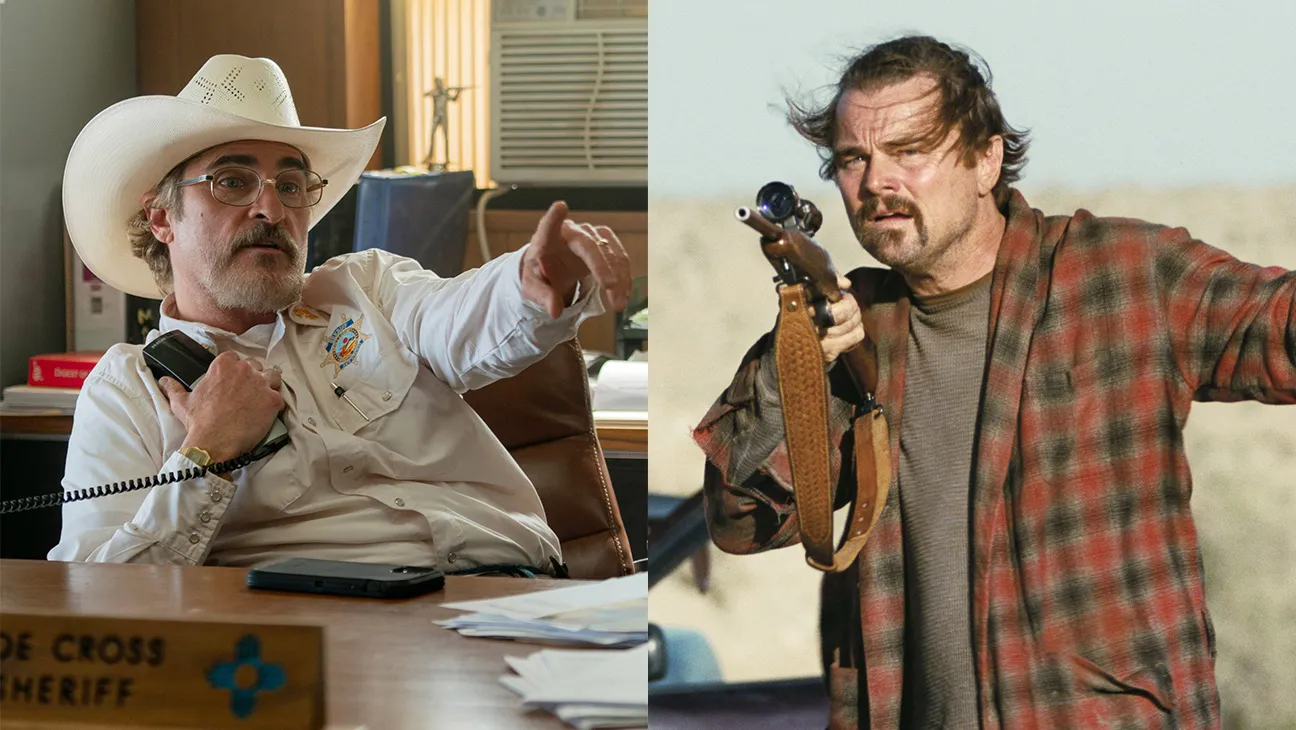
In the immediate aftermath of conservative activist Charlie Kirk’s murder, one of the most vexing things occluding the facts of what happened was a general illiteracy regarding the online culture that had engulfed the alleged killer — its memes and codes and ideologies. Reading about it all, I wondered why most of us don’t know enough about this stuff, and why this significant aspect of culture seems so siloed off from everything else.
This summer, A24’s prickly COVID comedy Eddington, from writer-director Ari Aster, failed to catch fire at the box office. Perhaps the film’s fate was sealed when it premiered to mixed reception at the Cannes Film Festival two months prior. Or Eddington was doomed even before that. It is, after all, a political film, one that tangles with Trumpism, extremism and the steadily mounting distrust that Americans feel toward one another. Aster’s film is Very Online, which was perhaps an unappealing prospect for potential moviegoers.
Maybe Eddington was simply ahead of its time; perhaps in another five years audiences will feel ready to examine what we’re currently living through, when it (hopefully) no longer has such a bitter sting of relevance. Or the public’s general distaste for being confronted with tetchy societal issues will still prevail; doom-scrolling should be done on one’s phone at home, not out in the world among other people.
Such atomization is a metastasizing problem. A gap is ever widening, with traditional artforms on one side and the vast jumble of internet ephemera on the other. That stark distinction used to make more sense, back when whatever happened online stayed there and everything else in culture was, we determined, what really held a mirror up to life. But so much more of our time is spent online now that it’s become disingenuous and out-of-touch to insist, in film, that internet usage is merely an isolated distraction — especially at a time when violent action so often germinates online.
Eddington is about the awful collision of the virtual and the actual, depicting a horror scenario in which the whole of the internet descends on one small town in a matter of days. It’s a messy movie, but at least Aster is trying to describe the double consciousness of the modern era, the disorientation of tangible reality becoming affected by the stuff that is supposed to live safely inside our computers. And yet nobody wanted to go see it, perhaps discouraging other filmmakers from trying to do the same.
Which puts the artform on a (hopefully slow, but who knows these days) course toward obsolescence. Movies have tried in recent years to bring tech into film: texts popping up on screen, the Searching films, AI villains stalking the Mission: Impossible and M3gan crews, indie darlings like We’re All Going to the World’s Fair risking tedium by showing us the eerie stasis of online life. But the medium needs more than just a handful of attempts to capture this enormous, burgeoning facet of 21st century living. If part of film’s job is to illuminate the breadth of human experience, then it is failing in a crucial way.
I am about as eager to watch 4chan: The Motion Picture as anyone else, but what comes out of those dark recesses is certainly worth dramatizing and, grim as it may be to do so, understanding. Much of that responsibility must first fall to journalists, those brave enough to traverse the internet wilds and report back their findings, to help interpret, say, meme language etched onto bullets. But art ought to tangle with this stuff more thoroughly, too, in order to help us finally accept that the offline and the online have so completely blurred together.
The recently Emmy-bedecked smash Adolescence, among Netflix’s most-watched shows ever, dealt with the fallout of a young man’s online radicalization into misogyny, but we only get to know him offline, after something terrible has happened. The upcoming Apple show The Savant, starring Jessica Chastain as a woman who monitors and engages with white supremacists online, tries to address these difficult matters too. It will be interesting to see if its creators are willing to show the true depravity lurking in frighteningly accessible corners of the internet, or if they will — like so many others — sand things down just enough to make it all more palatable.
The Savant is only about one kind of internet extreme. Kirk’s alleged killer is not, it seems, of that same ilk. But he is one of many thousands, if not millions, of young men who ventured onto the web in their teens and never returned. What little we know of his ideology seems steeped in the argot of online gamer culture, a tongue foreign to too many of us. The world he lived in should probably not feel so alien.
Film is an inherently sluggish medium; it takes time to make, and thus commentary is usually delayed by a few years. Only a rare few films feel as if they are precisely reactive to the present tense. Perhaps, then, there will eventually be movies that meaningfully address what online life is today. I sort of doubt it, though.
One of the main problems, of course, is the physical passivity. How do you compellingly dramatize a person sitting and reading and typing? It may require stretching an audience’s patience. There are a few examples to follow, films like Bo Burnham’s Eighth Grade, which successfully fused a teenager’s complicated online life with her painful irl experience. But Eighth Grade was not exactly a blockbuster; it’s hard to imagine a commercial film that could do something similar without it all turning into Ready Player One — and Steven Spielberg making a largely computer-animated film about a teenage boy learning about the red pill is pretty unlikely.
Something must be figured out, though. It’s increasingly untenable to make convincing films about the here and now, particularly about contemporary politics, without somehow incorporating this huge incubator of ideology. And that need will only intensify as the people of Gen Z and Gen Alpha grow older and the world is suddenly contending with adults who were weaned on wifi. Maybe some of them will make the art that reflects their half-digital existences, but I suspect the ones to be most concerned about won’t bother sharing their thoughts.
What we are likely to be served are movies that allegorize or gesture toward internet culture rather than address it literally. Many of the racist, nativist vulgarities spoken out loud in Paul Thomas Anderson’s marvelous new film One Battle After Another evoke sentiments that, in our world, first fomented online. The film barely mentions the internet, and yet its presence as a culture-shaping force is felt throughout. It is implied in the terrifying power of the military and police — how else but through the internet could this government have marshaled enough public support to install them in office?
It is entirely possible that Eddington was simply the victim of early arrival. A market for films that grimly satirize, or otherwise confront, the swirling nightmare that the internet — once so naïvely greeted as a newfound utopia — has become might still emerge. When I first watched Eddington, I found it irksome, off-putting. It was only on second watch that I realized that at least some of that distaste was the film achieving its intended effect: My repulsion was one of recognition. The film offers the opposite of escapism, which is what we so often seek from movies. But we are well past the point at which it was possible to meaningfully escape the internet. Pandora has opened her box and its ills are fully integrated into our world. They should probably be in some of our movies then, too.



